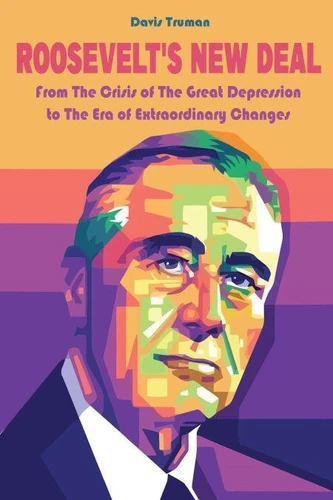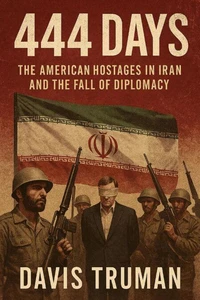Roosevelt's New Deal From The Crisis of The Great Depression to The Era of Extraordinary Changes
Par :Formats :
Disponible dans votre compte client Decitre ou Furet du Nord dès validation de votre commande. Le format ePub est :
- Compatible avec une lecture sur My Vivlio (smartphone, tablette, ordinateur)
- Compatible avec une lecture sur liseuses Vivlio
- Pour les liseuses autres que Vivlio, vous devez utiliser le logiciel Adobe Digital Edition. Non compatible avec la lecture sur les liseuses Kindle, Remarkable et Sony
 , qui est-ce ?
, qui est-ce ?Notre partenaire de plateforme de lecture numérique où vous retrouverez l'ensemble de vos ebooks gratuitement
Pour en savoir plus sur nos ebooks, consultez notre aide en ligne ici
- FormatePub
- ISBN8215482308
- EAN9798215482308
- Date de parution12/04/2023
- Protection num.pas de protection
- Infos supplémentairesepub
- ÉditeurWMG Publishing
Résumé
The Roosevelt New Deal was a series of domestic programs and initiatives launched by President Franklin D. Roosevelt shortly after he assumed office in 1933. At that time, the United States faced one of the worst economic crises in its history, with unemployment rates exceeding 25%, banks failing, and businesses closing down. In response to this crisis, Roosevelt sought to implement a range of policies to address the immediate needs of the people, as well as the underlying causes of the economic downturn.
The New Deal was based on three primary goals: relief, recovery, and reform. Relief measures aimed to provide immediate assistance to those most affected by the Great Depression, including the unemployed, farmers, and the elderly. Recovery efforts focused on restoring the economy and creating jobs. At the same time, reform measures sought to address the structural issues that had contributed to the crisis, such as the lack of financial regulation and social safety nets.
Some of the critical initiatives of the New Deal included the creation of the Civilian Conservation Corps (CCC), which employed young men to work on public projects such as road building and conservation; the establishment of the Works Progress Administration (WPA), which provided jobs and training to millions of unemployed workers; and the implementation of agricultural subsidies to support struggling farmers.
The New Deal also saw significant changes in the regulation of the financial sector, including the creation of the Federal Deposit Insurance Corporation (FDIC) to insure bank deposits and the Securities and Exchange Commission (SEC) to regulate the stock market. Other reforms included establishing social security, which provided retirement benefits to elderly Americans, and the National Labor Relations Act, which protected workers' rights to unionize.
While the New Deal faced criticism from some who saw it as an overreach of government power, it is widely regarded as a turning point in American history. Its impact on American society and politics is still felt today, with many programs and policies remaining in place. The New Deal's legacy is often studied as a case study of the role of government intervention in economic and social policy. Its successes and failures continue to be debated by scholars and policymakers alike.
The New Deal was based on three primary goals: relief, recovery, and reform. Relief measures aimed to provide immediate assistance to those most affected by the Great Depression, including the unemployed, farmers, and the elderly. Recovery efforts focused on restoring the economy and creating jobs. At the same time, reform measures sought to address the structural issues that had contributed to the crisis, such as the lack of financial regulation and social safety nets.
Some of the critical initiatives of the New Deal included the creation of the Civilian Conservation Corps (CCC), which employed young men to work on public projects such as road building and conservation; the establishment of the Works Progress Administration (WPA), which provided jobs and training to millions of unemployed workers; and the implementation of agricultural subsidies to support struggling farmers.
The New Deal also saw significant changes in the regulation of the financial sector, including the creation of the Federal Deposit Insurance Corporation (FDIC) to insure bank deposits and the Securities and Exchange Commission (SEC) to regulate the stock market. Other reforms included establishing social security, which provided retirement benefits to elderly Americans, and the National Labor Relations Act, which protected workers' rights to unionize.
While the New Deal faced criticism from some who saw it as an overreach of government power, it is widely regarded as a turning point in American history. Its impact on American society and politics is still felt today, with many programs and policies remaining in place. The New Deal's legacy is often studied as a case study of the role of government intervention in economic and social policy. Its successes and failures continue to be debated by scholars and policymakers alike.
The Roosevelt New Deal was a series of domestic programs and initiatives launched by President Franklin D. Roosevelt shortly after he assumed office in 1933. At that time, the United States faced one of the worst economic crises in its history, with unemployment rates exceeding 25%, banks failing, and businesses closing down. In response to this crisis, Roosevelt sought to implement a range of policies to address the immediate needs of the people, as well as the underlying causes of the economic downturn.
The New Deal was based on three primary goals: relief, recovery, and reform. Relief measures aimed to provide immediate assistance to those most affected by the Great Depression, including the unemployed, farmers, and the elderly. Recovery efforts focused on restoring the economy and creating jobs. At the same time, reform measures sought to address the structural issues that had contributed to the crisis, such as the lack of financial regulation and social safety nets.
Some of the critical initiatives of the New Deal included the creation of the Civilian Conservation Corps (CCC), which employed young men to work on public projects such as road building and conservation; the establishment of the Works Progress Administration (WPA), which provided jobs and training to millions of unemployed workers; and the implementation of agricultural subsidies to support struggling farmers.
The New Deal also saw significant changes in the regulation of the financial sector, including the creation of the Federal Deposit Insurance Corporation (FDIC) to insure bank deposits and the Securities and Exchange Commission (SEC) to regulate the stock market. Other reforms included establishing social security, which provided retirement benefits to elderly Americans, and the National Labor Relations Act, which protected workers' rights to unionize.
While the New Deal faced criticism from some who saw it as an overreach of government power, it is widely regarded as a turning point in American history. Its impact on American society and politics is still felt today, with many programs and policies remaining in place. The New Deal's legacy is often studied as a case study of the role of government intervention in economic and social policy. Its successes and failures continue to be debated by scholars and policymakers alike.
The New Deal was based on three primary goals: relief, recovery, and reform. Relief measures aimed to provide immediate assistance to those most affected by the Great Depression, including the unemployed, farmers, and the elderly. Recovery efforts focused on restoring the economy and creating jobs. At the same time, reform measures sought to address the structural issues that had contributed to the crisis, such as the lack of financial regulation and social safety nets.
Some of the critical initiatives of the New Deal included the creation of the Civilian Conservation Corps (CCC), which employed young men to work on public projects such as road building and conservation; the establishment of the Works Progress Administration (WPA), which provided jobs and training to millions of unemployed workers; and the implementation of agricultural subsidies to support struggling farmers.
The New Deal also saw significant changes in the regulation of the financial sector, including the creation of the Federal Deposit Insurance Corporation (FDIC) to insure bank deposits and the Securities and Exchange Commission (SEC) to regulate the stock market. Other reforms included establishing social security, which provided retirement benefits to elderly Americans, and the National Labor Relations Act, which protected workers' rights to unionize.
While the New Deal faced criticism from some who saw it as an overreach of government power, it is widely regarded as a turning point in American history. Its impact on American society and politics is still felt today, with many programs and policies remaining in place. The New Deal's legacy is often studied as a case study of the role of government intervention in economic and social policy. Its successes and failures continue to be debated by scholars and policymakers alike.























